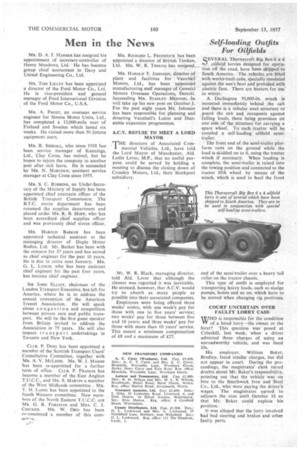Men in the News
Page 32

If you've noticed an error in this article please click here to report it so we can fix it.
Ma. D. A. J. NlimsER has resigned his appointment of secretary-controller of Henry Meadows, Ltd. He has become group chief accountant to Davy and United Engineering Co., Ltd.
MR, Tom L1LLEY has been appointed a director of the Ford Motor Co., Ltd. He is vice-president and general manager of Ford International Division of the Ford Motor Co., U.S.A.
MR. A. FROST, an overseas service engineer for Simms Motor Units, Ltd., has completed a 13,000-mile tour of Finland and Sweden which lasted six weeks. He visited more than 50 Simms equipment users.
MR. R. SIDDALL, who since 1938 has been service manager of Kennings, Ltd., Clay Cross, has retired, but he hopes to rejoin the company in another post after sick leave. He is succeeded by MR. N. MARSDEN, assistant service manager at Clay Cross since 1955.
MR. S. C. ROBBINS, an Under-Secretary of the Ministry of Supply has been appointed chief contracts officer of the British Transport Commission. The B.T.C. stores department has been renamed the supplies department and placed under MR. R. B. HOFF, who has been accredited chief supplies officer and was previously chief stores officer.
MR. HAROLD BARKER has been appointed technical assistant to the managing director of Duple Motor Bodies, Ltd. Mr. Barker has been with the concern for 37 years and has served as chief engineer for the past 10 years. He is due to retire next January. MR. G. L. LYNCH, who has been assistant chief engineer for the past four years, has become chief engineer.
StR JOHN ELLIOT, chairman of the London Transport Executive, has left for America, where he is to address the annual convention of the American Transit Association. He will speak about congestion and competition between private cars and public transport. He will be the first guest speaker from Britain invited to address the Association in 75. years. He will also inspect transport undertakings in Toronto and New York.
• CLLR. P. Dom has been appointed a member of the Scottish Transport Users' Consultative Committee, together with MR. A. V. MCLEOD. MR. W. J. MASON has been re-appointed for a further term of office. CLLR. P. FRANCIS has become a member of the East Anglian T.U.C.C., arid MR. S. MARTIN a member of the West Midlands committee.. MR. T. H. LAING has been appointed to the South Western committee. New members of the North Eastern T.U.C.C. are MR. G. R. FOREMAN and MRS. C. J. CHICKEN. MR. W. ORD has been re-l000inted a member of this corn MR. RICHARD L. FREDERICK has been appointed a director of British Timken, Ltd. MR. W. R. TimkEN has resigned.
MR. HAROLD T. JOHNSON, director of plant and facilities for Vauxhall Motors, Ltd., has been appointed manufacturing staff manager of General Motors Overseas Operations, Detroit. Succeeding MR. STANLEY MENTON, he will take up his new post on October 1. For the past eight years Mr. Johnson has been responsible for planning and directing Vauxhall's Luton and Dunstable expansion programmes.
A.C.V. REFUSE TO MEET A LORD ' MAYOR .THE directors of Associated Commercial Vehicles, Ltd., have told the Lord Mayor of Manchester, All. Leslie Lever, M.P., that no useful purpose could be served by holding a meeting to discuss the closing down of Crossley Motors, Ltd., their Stockport subsidiary.
Mr. W. R. Black, managing director, told Ald. Lever that although the closure was regretted it was inevitable. He stressed, however, that A.C.V. would try to absorb as many people as possible into their associated companies.
Employees were being offered three weeks' notice, with one week's pay for those with one to five years' service; two weeks' pay for those between five and 10 years; and three weeks' pay for those with more than 10 years' service. This meant a minimum compensation of 18 and a maximum of £27.




























































































